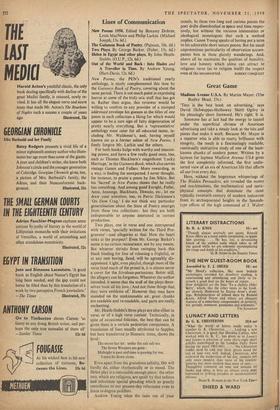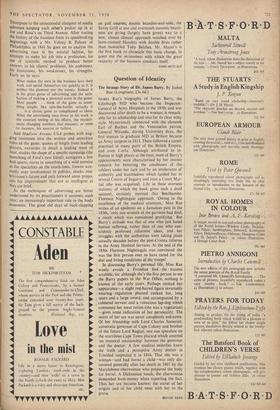Great Game
Madison Avenue U.S.A. By Martin Mayer. (The Bodley Head, 25s.)
`Tins is the best book on advertising,' says David (Schweppes-Hathaway Shirt) Ogilvy in his pleasingly short foreword. He's right. It is.
Someone has at last had the energy to tunnel under the superficial chrome of American 'advertising and take a steady look at the bits and pieces that make it work. Because Mr. Mayer is a reporter who is able to marry brilliance with integrity, the result is a fascinatingly readable, continually instructive study of one of the least- known chunks of modern power. Written by a layman for laymen Madison Avenue USA gives the first completely informed, the first undis- torted view of an era of American life that affects all our lives every day.
Here, without the bogeyman whisperings of The Hidden Persuaders, are revealed the mores and machinations, the mathematical and meta- physical concepts that dominate the most typically twentieth-century of modern industries from its archiepiscopal heights in the Spanish- type offices of the high command of J. Walter
Thompson to the unsuccessful clangour of media
• salesmen keeping each other's pecker tip in at Joe and Rosa's on Third Avenue. After tracing the history of the business from its spacebroking beginnings with a Mr. Volney' B. Palmer of Philadelphia in 1841 he goes on to analyse the advertising man in his natural habitat, his attempts to make his jOb into a profession, his use of scientific method to 'produce better answers to his clientS' problems, his ambitions,: his limitations, his weaknesses, his strengths.: . Early on he says: What makes the men in the business love their work and spend themselves too quickly at it, is neither the glamour nor the money. Instead it is the great game of advCrtising and the satis- faction of making a personal score in the game. Most people . . . think of the game as some- , thing simple, like spin-the-bottle; actually it ". . . is a classic ganie as complicated as "chess. What the advertising man loves in his work is the constant testing of his efforts, the mysteri- ously changing numbers that measure, or seem. to measure, his success or failure.
And Madison Avenue USA probes with nag- ging insistence into the• written and unwritten rules Of the game, quotes at length from leading Players, examines in detail a leading team of four, studies the shape of a specific campaign (the launching of Ford's new Edsel), castigates a few bad sports, stares in something of a wild surmise at the specialists on the touch-lines, frowns wor- riedly over involvement in politics, clucks Over television's future and puts forward some propo, sals' for improvement that are as intelligent as they are brief. • As the techniques of advertising are betel' understood by its practitioners it assumes, each year, an increasingly important role in the body economic. The good old days of back-slapping on golf courses, double brandies-and-soda, the Savoy Grill at one and Overmuch masonic hearti- ness are giving (largely have given) way to a new, almost clinical approach watched over by horn-rimmed Hamlets with double firsts rather than monocled Toby Belches. Mr. Mayer's is the first book to chronicle this basic change, io point out the seriousness with which the great majority of the business conducts itself.
JOHN METCALF















































































 Previous page
Previous page